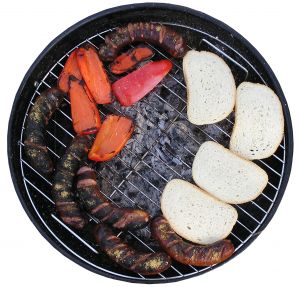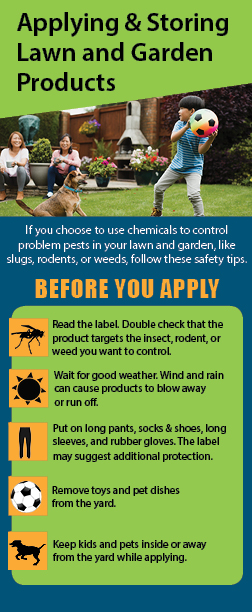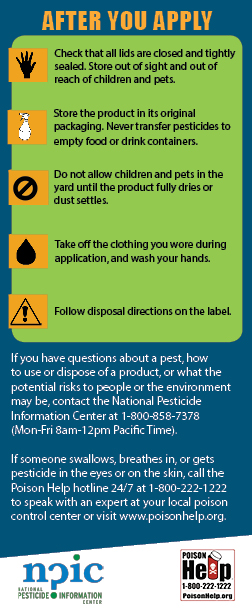Don't Let Warm Weather Hazards Ruin Your Outdoor Fun!
Spending time outdoors picnicking? Camping? Swimming? Celebrating your freedom? You could be exposed to poison hazards. Common poisons include spoiled food, hydrocarbons, mushrooms, carbon monoxide and swimming chemicals. By following a few poison prevention tips you can help make your warm weather activities poison safe.

Poison Prevention Tips
Food poisoning can ruin your picnic or camping trips. Keep "cold” foods cold and “hot” foods hot before and after serving. Thoroughly cook all foods according to standard guidelines. Pack soap and water and wash hands carefully before and after handling food. Put left over food in the ice chest right away.
Be careful with gasoline, kerosene and charcoal lighter fluid. Follow the directions when using the products and keep them in their original labeled containers. Open containers carefully and keep the products locked up where children cannot see them or reach them.
Minimize exposure to carbon monoxide. Carbon Monoxide is an invisible, tasteless, odorless gas that comes from burning fossil fuels like natural gas, gasoline, kerosene, methane, propane, oil, coal and wood. Gas fired barbeque and charcoal grills must never be used inside a house or garage - not even with the door opened. When camping, use only battery powered heaters and lights in tents, trailers, or motor homes. Never use fuel-burning appliances inside.
Follow label directions when using pool products. Swimming pool/hot tub products like chlorine contain dangerous chemicals that can poison you if you use them in the wrong way and in the wrong amount. Keep products in their original labeled containers. Open containers carefully and keep the products locked-up where children cannot see them or reach them.
Insects start to emerge in the spring. Avoid attracting insects by keeping trash cans covered and putting leftover food away. Avoid wearing brightly colored clothing, heavy perfumes. If a flying insect approaches, move away from the insect without waving your hands and arms. Wear a Medic-Alert bracelet if you have a history of a life-threatening allergic reaction and ask your physician about prescribing an emergency bee sting kit to have in an emergency.
All spiders are venomous with varying degrees of potency. Be careful reaching near corners. Shake all shoes, clothing, towels and bedding that have been sitting around. Dust and vacuum around windows, corners of rooms, and under furniture regularly.
Pesticides are chemicals used to kill pests. The three most common are insecticides, herbicides and rodenticides. Keep pesticides locked-up where children cannot see them or reach them. Read the label and follow instructions, including all precautions and restrictions. Keep pesticides in their original containers. Use child-resistant packaging properly by closing the container tightly after use (see infographic below).
In the spring, snakes emerge from their winter dens to hunt for food and water. Snakes seek shelter from the sun under rocks, bushes, in caves and animal burrows. Always be aware of your surroundings. Do not reach into cracks in rocks, animal burrows or under bushes. Do not tease, kill or handle a rattlesnake.
Outdoor and indoor plants. Know the names of your indoor and out door plants and find out if they are poisonous. Keep all poisonous plants, bulbs, seeds and plant foods where children cannot reach them. Teach children not to put leaves, stems, bark, berries, seeds or nuts from any plant into their mouths.
Fireworks! Fireworks contain chemicals such as potassium nitrate, white phosphorus, barium chlorate, and arsenic. Ingesting large amounts of these chemicals can lead to electrolyte imbalances and organ failure. Glow sticks contain a chemical called dibutyl phthalate. This chemical causes an intense burning and stinging sensation when ingested but does not actually cause burns to the tissue. Dibutyl phthalate is irritating to the mouth, eyes and nose but these symptoms typically go away within a short period.
Call the New Mexico Poison Center at 1-800-222-1222 for poisoning emergencies, 24-hours a day, 7-days a week.



